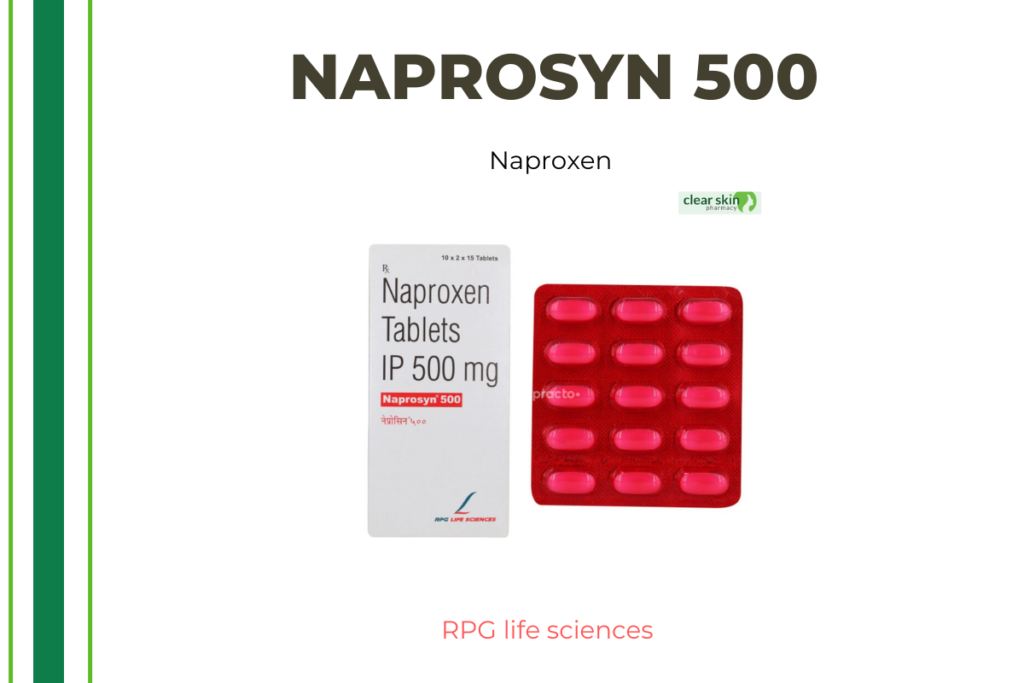Naprosyn 500 Mg
Naprosyn 500 belongs to the NSAID (nonsteroidal anti-inflammatory drug) class of painkillers (NSAIDs). Naprosyn 500 is used to treat osteoarthritis, rheumatoid arthritis, ankylosing spondylitis (back pain and rigidity), cervical spondylitis (disc degeneration in the neck), and acute gout (severe pain due to excess of uric acid).
Naprosyn 500 works by inhibiting the cyclo-oxygenase (COX) enzyme, which is involved in the formation of chemical compounds like prostaglandins that cause pain and inflammation in the body. As a result, it helps alleviate the pain and edema associated with various types of arthritis. It is also used to treat fibrositis (muscle pain and rigidity), tenosynovitis (tendon swelling), low back pain, strains, and sprains. Arthritis is a disorder in which one or more joints swell, causing progressive pain and rigidity in the joints.
With or after a meal, Naprosyn 500 should be swallowed whole with a modest amount of water. It should not be fractured, crushed, or chewed. The frequency with which you should take your medications will be determined by your doctor based on your medical condition. Possible side effects include indigestion, heartburn, gastrointestinal discomfort, nausea, headache, dizziness, drowsiness, bruises, itching, rash, and ringing in the ears. The majority of these Naprosyn 500 side effects do not necessitate medical attention and will subside with time. Please consult your physician if the adverse effects persist or worsen.
Inform your physician if you are allergic to Naprosyn 500 or any other drugs. Before taking Naprosyn 500, pregnant or lactating women should inform their doctor. Because it increases the risk of gastrointestinal bleeding, alcohol should not be consumed while taking Naprosyn 500. Naprosyn 500 may increase the likelihood of potentially fatal cardiac conditions such as myocardial infarction and stroke. No one who has recently undergone or is about to undergo cardiac bypass surgery should use it. Naprosyn 500 increases the risk of fatal gastrointestinal complications such as hemorrhage, ulcers, and stomach or intestine perforation.
Naprosyn 500 is prescribed for the treatment of joint pain and menstrual symptoms.

Medicinal Advantages
Osteoarthritis, rheumatoid arthritis, ankylosing spondylitis, tendinitis (tendonitis), bursitis (inflammation of fluid-filled pads – bursae near the joints), acute gout (joint pain due to excess uric acid), and dysmenorrhea are among the maladies that can cause pain or inflammation (menstrual cramps).
Utilize Directions
Take Naprosyn 500 only if prescribed by your doctor. Always adhere to your physician’s directions when taking Naprosyn 500. To prevent gastric upset, take Naprosyn 500 with a glass of water, preferably with or after a meal. It should not be fractured, crushed, or chewed. Before ingesting Naprosyn 500 as an oral suspension, shake the bottle vigorously.
Place in a cold, dry area out of direct sunlight.
Naprosyn 500 Adverse Reactions
As with any other medication, Naprosyn 500 can induce indigestion, heartburn, stomach pain, constipation, gas, vomiting, nausea, and diarrhea. The majority of Naprosyn 500 side effects do not necessitate medical attention and diminish over time. If the adverse effects persist, please consult a physician. Stop taking Naprosyn 500 and contact your doctor immediately if you observe bleeding from your back passage in the form of black, viscous stools or bloody stools, blood in your vomit, or abdominal pain that travels to your back.
Recommendations for Drugs
Naproxen may increase the risk of potentially fatal cardiac conditions, including myocardial infarction and stroke. No one who has recently undergone or is about to undergo cardiac bypass surgery should use it. Naproxen increases the risk of fatal gastrointestinal complications such as hemorrhage, ulcers, and stomach or intestine perforation. Due to the increased risk of gastrointestinal hemorrhage in elderly patients, their dose can be decreased. It is not recommended for pregnant women, particularly those in their third trimester, to take Naproxen because it may harm the infant. Therefore, expectant or nursing women should consult a physician before taking Naproxen. If you combine alcohol and Naproxen, you risk gastrointestinal bleeding or ulcers. Stop taking Naproxen and see a doctor immediately if you experience weight loss, diarrhea, pain, or vomiting, as these symptoms may indicate an exacerbation of Crohn’s disease or ulcerative colitis (swelling in digestive tract).
Interactions Among Medications
Naproxen may interact with painkillers (ibuprofen, diclofenac, paracetamol, aspirin), blood pressure medications (propranolol, enalapril, cilazapril, losartan, candesartan, eprosartan), water pills (furosemide), blood thinners (heparin, warfarin, clopidogrel), fits medications (phenytoin), and diabetic medications (Zidovudine).
Naproxen and alcohol may interact in terms of drug-food interactions. Therefore, alcohol consumption should be avoided while taking Naproxen, as it increases the risk of gastrointestinal bleeding.
Before taking Naproxen, individuals with diabetes, stomach ulcers, gastrointestinal bleeding, asthma, kidney, liver, or heart problems, and autoimmune conditions such as systemic lupus erythematosus (joint pain, fever, and skin rashes), colitis, or Crohn’s disease (conditions causing bowel swelling, diarrhea, bowel pain, vomiting, and weight loss) should consult a physician.
Safety Recommendations
ALCOHOL
It is advised that you refrain from consuming alcohol while taking Naproxen, as it may increase your risk of gastrointestinal bleeding and ulcers.
PREGNANCY
Naproxen is classified as a Category C pregnancy medication, which means it should not be taken during pregnancy, particularly in the third trimester. However, if you are expectant, you should consult a physician.
BREAST FEEDING
Avoid breastfeeding while taking Naproxen because it may be secreted in breast milk and cause adverse effects in the infant.
DRIVING
Naproxen can cause dizziness, sleepiness, drowsiness, and vision problems in some individuals. Therefore, after taking Naproxen, you should only drive if you are alert.
LIVER
Use Naproxen with caution if you have a history of liver disease or a liver condition. Your physician can adjust the dosage if necessary.
KIDNEY
Naproxen is contraindicated in patients with moderate to severe renal impairment and creatinine clearance of less than 30 mL/min. Your physician can adjust the dosage if necessary.
No habits formed
Diet and Lifestyle Advice
At least 30 minutes of daily cycling, walking, sprinting, dancing, or swimming is suggested.
Obesity can exacerbate joint pain and cause injury at the affected site. Maintain a wholesome body weight (BMI between 18.5 and 24.9).
Consume a diet low in fat and calories that is rich in fruits and vegetables.
avoiding alcohol consumption and ceasing smoking
Recommendations
Please inform your physician if you are elderly, a smoker, have had a stroke in the past, or if you have high blood pressure, diabetes, or excessive cholesterol, as these conditions may increase your risk for heart problems.
If you exceed the recommended dose of Naproxen, you may experience symptoms such as heartburn, stomach pain, unconsciousness, vertigo, ringing or buzzing in the ears, fits, fainting, diarrhea, or excitement.
Additional Information: This item cannot be returned.
Diseases and Conditions Glossary
Arthritis is a disorder in which one or more joints swell, causing progressive pain and rigidity in the joints. There are several types of arthritis, with osteoarthritis and rheumatoid arthritis being the most prevalent. Arthritis is characterized by joint pain, stiffness, redness, tenderness, edema in and around joints, and restricted joint movement. Age, obesity, prior joint injury, and family history all increase the likelihood of developing arthritis. Medication, physiotherapy, and, in some instances, surgery may alleviate arthritic symptoms and enhance quality of life.
FAQs
With naproxen, menstrual symptoms can be alleviated. Naproxen is a pain reliever that inhibits the production of the chemical messenger prostaglandin (PG), which causes the uterus (womb) to contract during menstruation.
Arthritis is a chronic, excruciating, and inflammatory disease of the joints. Naproxen does not remedy arthritis, but it alleviates its symptoms, such as joint pain, inflammation, and stiffness.
Not to be taken during pregnancy, particularly in the last three months. It has the potential to effect and harm a fetus (fetus). Before taking Naproxen if you are pregnant or planning to become pregnant, consult your doctor.
When consumed in large doses or for an extended period of time, naproxen can increase the risk of cardiovascular complications such as heart attack and stroke. Before taking Naproxen, you should consult a physician if you have any of these conditions or a history of heart problems or stroke. However, it is recommended that you take Naproxen according to the dosage and duration prescribed by your doctor. Patients who have recently undergone cardiac bypass surgery should not use it (coronary artery bypass graft – CABG).
As naproxen is a pregnancy category C medication, it is recommended to consult a physician prior to use. By inhibiting ovulation (the release of an egg from the ovary) and decreasing progesterone levels, it may cause infertility in women. However, this effect is temporary, and ovulation typically returns to normal one month after discontinuing Naproxen. However, if you are pregnant or trying to conceive, you should consult your doctor before taking Naproxen.
It is not recommended to take Naproxen with warfarin because the combination may increase the risk of hemorrhage. If you observe blood in your urine or stools, dizziness, unusual bleeding or bruises, vomiting, weakness, or a headache, please see a doctor immediately. If you must take these medications at the same time, discuss with your doctor how the doses should be adjusted so that you can do so safely.








Be the first to review “NAPROSYN 500 10 Tablets”